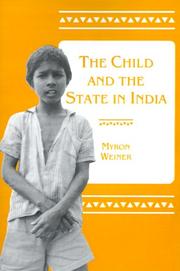| Listing 1 - 1 of 1 |
Sort by
|

ISBN: 0691018987 0691078688 9780691078687 9780691018980 Year: 1991 Publisher: Princeton, N.J. Princeton University Press
Abstract | Keywords | Export | Availability | Bookmark
 Loading...
Loading...Choose an application
- Reference Manager
- EndNote
- RefWorks (Direct export to RefWorks)
India has the largest number of non-schoolgoing working children in the world. Why has the government not removed them from the labor force and required that they attend school, as have the governments of all developed and many developing countries? To answer this question, this major comparative study first looks at why and when other states have intervened to protect children against parents and employers. By examining Europe of the nineteenth century, the United States, Japan, and a number of developing countries, Myron Weiner rejects the argument that children were removed from the labor force only when the incomes of the poor rose and employers needed a more skilled labor force. Turning to India, the author shows that its policies arise from fundamental beliefs, embedded in the culture, rather than from economic conditions. Identifying the specific values that elsewhere led educators, social activists, religious leaders, trade unionists, military officers, and government bureaucrats to make education compulsory and to end child labor, he explains why similar groups in India do not play the same role.
School management --- Economic structure --- India --- Child labor --- Education, Compulsory --- Government policy --- Education, Compulsory. --- Government policy. --- -Child labor --- -Children --- Employment of children --- Labor --- Age and employment --- Compulsory education --- Compulsory school attendance --- Educational law and legislation --- -Employment --- -Government policy --- -Education, Compulsory --- Children --- Employment --- Frequentation scolaire --- Éducation des enfants --- Enfants --- Scolarite obligatoire. --- Scolarite obligatoire --- Politique publique --- Travail --- Politique gouvernementale. --- Politique gouvernementale --- India. --- Austria. --- Basic Education. --- Constitution of India. --- English Poor Law (1601). --- Eswaran, Girija. --- Factories Act (1948). --- Gandhi Labour Institute. --- Gandhi, Mahatma. --- Gujarat, educational system. --- Gupta, Meena. --- Hamilton, Alexander. --- Harbans Singh Report. --- Hartog Committee. --- Illich, Ivan. --- Indian Educational Services. --- Indian Mines Act (1923). --- Indian National Congress. --- Indian Social Institute. --- Institute of Education (Pune). --- Karnataka. --- Knights of Labor. --- Knox, John. --- Lakshmanan. --- Luther, Martin. --- Massachusetts. --- Mines Act (1952). --- Old Deluder Satan Law (1647). --- Operation Blackboard. --- Prema Seva Sadan. --- Smith, Adam. --- apprenticeship. --- attitudes toward childhood. --- bidi industry. --- bonded labor. --- brassware industry. --- carpet industry. --- common-school movement. --- cottage industries. --- dropout rates. --- education, state policies. --- expenditures on education. --- female education and fertility rates. --- fireworks industry. --- goals of education. --- indentured labor. --- literacy rates. --- match industry. --- minimum wage. --- nonformal education. --- pottery industry. --- school enrollments. --- science teaching. --- Bharat --- Bhārata --- Government of India --- Ḣindiston Respublikasi --- Inde --- Indië --- Indien --- Indii︠a︡ --- Indland --- Indo --- Republic of India --- Sāthāranarat ʻIndīa --- Yin-tu --- インド --- هند --- Индия --- Child labor - Government policy --- Child labor - Government policy - India --- Education, Compulsory - India --- Attitude envers les enfants --- Enfant --- Et les enfants --- Progéniture --- Relations avec les enfants --- Articles pour enfants --- Arts et enfants --- Enfants et violence --- Fosterage --- Jeunesse --- Meubles pour enfants --- Bibliothèques pour enfants --- Modules d'activités temporaires et alternatives à la scolarité --- Parapsychologie et enfants --- Parents --- Parents et enfants --- Personnes sans enfant --- Relations entre enfants --- Vêtements d'enfant --- Chapeaux d'enfant --- Chez l'enfant --- Coloriage pour enfants --- Éducation des enfants --- Beaux-enfants --- Disques pour enfants --- Enfants d'enseignants --- Enfants de célébrités --- Enfants de chômeurs --- Enfants de collaborateurs --- Enfants de handicapés --- Enfants de la classe ouvrière --- Enfants de malades --- Enfants de médecins --- Enfants de militaires --- Enfants de militants politiques --- Écoliers --- Enfants de parents appartenant à des minorités sexuelles --- Enfants de Pieds-noirs --- Enfants de prisonniers --- Enfants de prostituées --- Enfants écologistes --- Enfants écrivains --- Enfants en milieu urbain --- Enfants internautes --- Enfants kamikazes (attentats-suicides) --- Enfants maltraités --- Enfants naturels --- Enfants préhistoriques --- Enfants prostitués --- Enfants sans-abri --- Enfants seuls --- Enfants sorciers --- Enfants terrorristes --- Environnement et enfants --- Filles --- Garçons --- Enfants artistes --- Médias et enfants --- Médias pour la jeunesse --- Nourrissons --- Ordinateurs et enfants --- Orphelins --- Pastorale des enfants --- Premiers-nés --- Présidents --- Publicité et enfants --- Rang de naissance --- Enfants autochtones --- Rois et souverains --- Enfants célèbres --- Enfants d'alcooliques --- Enfants d'anciens combattants --- Enfants d'écrivains --- Âges de la vie --- Famille --- Groupes d'âge --- Mineurs (droit) --- Éducation familiale --- Éducation morale --- Service social scolaire --- Enfants et philosophie --- Enseignement primaire --- Gouvernantes --- Rôle parental --- Éducation de la première enfance --- Éducation physique et sportive pour enfants --- Éducation religieuse des enfants --- Éducation sexuelle des enfants --- Éducation --- Assiduité aux cours --- Assistance aux cours --- Élèves --- Inscription dans les écoles --- Scolarisation --- Effectifs scolaires --- Abandon des études --- Absentéisme scolaire --- Année scolaire --- Phobie scolaire --- Rentrée scolaire --- Semaine scolaire --- Transport scolaire --- Universités --- Administration scolaire --- Âge scolaire --- Scolarité obligatoire --- Dans l'art --- Livres et lecture --- Loisirs --- Psychologie --- Statut juridique --- Au cinéma --- Langage --- Développement --- Santé et hygiène --- Discipline --- Éducation à la propreté --- Inscription --- Exclusion --- Inscriptions --- Indi --- Indii͡
| Listing 1 - 1 of 1 |
Sort by
|

 Search
Search Feedback
Feedback About UniCat
About UniCat  Help
Help News
News